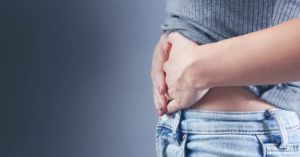5 Strategies for Minimizing Weight Gain After Gallbladder Removal
Stubborn weight gain can be a common side effect after gallbladder removal that many are concerned about.
As your body is healing post-surgery, it’s getting used to the changes in your digestive system and metabolism.
So since weight gain– among other frustrating symptoms– can come with gallbladder removal, I want to give you the tools you need to help navigate this side effect.
As a holistic nutritionist focusing on all things gallbladder, I’ve helped tons of my clients through shedding weight post-removal and avoiding weight gain all together.
In this blog, we’ll discuss why weight gain is a common side effect of gallbladder removal, and 5 tips for you to implement to minimize this weight gain.
Indications for Gallbladder Removal
 When you suffer from gallbladder disease, the most frustrating and painful symptoms are usually due to gallstones. And gallstones are a primary reason behind gallbladder removal.
When you suffer from gallbladder disease, the most frustrating and painful symptoms are usually due to gallstones. And gallstones are a primary reason behind gallbladder removal.
The gallbladder is designed to concentrate and store bile. And bile is responsible for the breakdown of dietary fat and fat-soluble vitamins.
While you can absolutely live without a gallbladder, gallbladder removal changes the physiology of your digestion and metabolism leading to metabolic risks following removal for some. This change in metabolism and digestion can result in:
- Impaired blood glucose control
- Fatty liver disease
- Insulin resistance
- High blood lipids
Causes of Weight Gain After Gallbladder Removal
There are a few reasons why we commonly see weight gain after gallbladder removal.
Changes In Bile
Without a gallbladder, bile acid composition changes. Typically, bile is stored in the gallbladder, then released to signal the start of digestion. It emulsifies and breaks down fats.
Because bile supports your body in fat digestion and detoxification of excess cholesterol, it’s a crucial component of our digestion. But without a gallbladder, there isn’t a place to store and concentrate bile, so it slowly drips into the intestines.
Because of this, there isn’t enough bile to properly digest fats when you need it– right after you’ve eaten a meal with fat.
Impaired bile composition and bile flow affect all processes downstream, impacting the liver, gut health, and hormone balance.
Fatty Liver Disease
Glucose and fat metabolism changes can cause fatty liver– which is a build-up of fat around the liver leading to serious complications and potential organ damage.
Studies show that post-gallbladder removal, fat tissue in the liver is increased, and the accumulation of fat in the liver affects triglyceride metabolism.1
So gallbladder removal is a direct risk factor for the development of metabolic dysfunction-associated fatty liver disease.2
Altered Gut Microbiome and Impaired Detoxification
Gallbladder removal can also alter the gut microbiome. Bile that is typically secreted by the gallbladder when needed works to protect our microbiome. But when it isn’t held in the gallbladder as a storage place, the integrity of the gut is compromised.
This also leads to impaired detoxification in the digestive tract. And not only detoxification of excess lipids but also of excess hormones.
Hormone Imbalance
The gallbladder helps the liver excrete excess hormones like estrogen. So when the gallbladder is removed, you could experience hormone imbalance, which can lead to estrogen dominance.
All of these factors may ultimately result in metabolic syndrome and body fat gain.3
Beyond the metabolic changes after gallbladder removal, there are other factors contributing to weight gain such as:
- Poor blood sugar control
- Stress
- Lack of sleep
- Poor diet
- Sedentary lifestyle
5 Strategies for Minimizing Weight Gain After Gallbladder Removal
If you’re someone experiencing weight gain after gallbladder removal, you’re not alone. Tons of my clients deal with this frustrating side effect, but with patience and dedication, you can overcome your weight challenges.
Here are 5 strategies to help shed that weight, and prevent weight gain for good.
1. Focus On Your Diet
Keeping a balanced diet is a crucial component of gallbladder removal recovery. We can’t expect to lose weight if we keep our diet the same as it was pre-removal.
 To help with stubborn weight gain, focus on balancing your plate at every meal.
To help with stubborn weight gain, focus on balancing your plate at every meal.
Make sure your meals include healthy fats, high-quality carbohydrates, and lean protein. Adding a source of fiber from fruits or veggies helps to balance your blood sugar and contributes essential vitamins, minerals, and antioxidants.
It’s also essential to avoid inflammatory foods like:
- Sugars
- Refined carbohydrates
- Inflammatory oils like corn, sunflower, soy, and vegetable oils
Inflammatory foods can cause unwanted weight gain and ultimately lead to chronic disease. So focus on anti-inflammatory foods to help reduce weight gain, like green leafy vegetables, nuts, berries, and green tea.
2. Practice Mindful Eating
Mindful eating is an overlooked strategy, but being more present at meal times helps you with portion control and recognizing your body’s needs.
When your body is under stress, your digestive system shuts off. So your body’s ability to digest with stomach acids, bile, and enzymes is impaired.
This is especially important after gallbladder removal because your body is already trying to learn how to digest without a gallbladder. When you have your gallbladder removed, your fat digestion changes.
You can support your changing digestive system by chewing your food slowly. Also, try taking 5 deep breaths before you eat.
And don’t forget words of affirmation! Remind yourself that you honor and trust your body and that you’re eating foods that are nourishing and healing.
3. Support Your Gut Health
One of the best ways to support your gut health is with prebiotics and probiotics. You can get them from foods or supplements.
Prebiotics are food or supplements for our beneficial gut bacteria. Probiotics are the beneficial bacteria themselves.
Some of my favorite probiotic foods include:
- Fermented foods
- Kombucha
- Yogurt
- Sauerkraut
- Kefir
Probiotic supplements are a great addition to your daily routine to help avoid weight gain and improve your gut health.
There are tons of probiotics on the market, so if you have questions about starting one, talk to your healthcare provider to find which supplement is best for you.
Also, consider taking bile salts to help improve bile and support fat digestion.
Choline is another supplement to consider to help digest fats and improve detoxification.
4. Keep Your Blood Sugar in Check
Eating every 3-4 hours helps to balance your blood sugar, and avoid cravings and crashes.
Your meals should include healthy fats, complex carbs, and lean protein, as well as fiber. A blood sugar-balanced diet is proven to help with metabolism and helps minimize weight gain, especially after gallbladder removal surgery.
Some of my other favorite strategies for maintaining healthy blood sugar include:
- Walking after meals to stabilize blood sugar and metabolism.
- Avoiding eating after dinner, especially sugary desserts!
- Avoid empty carbs, and always balance a carb with a protein.
- Avoid skipping meals or going hours at a time without food!
5. Move Your Body Daily
Develop a consistent  movement or exercise routine, and stick to it!
movement or exercise routine, and stick to it!
Both aerobic and strength training are beneficial in:
- Improving bile acid production
- Improving gut motility
- Decreasing liver fat
- Improving insulin resistance
- Enhancing lipid metabolism
And of course, getting your heart rate up and increasing your muscle mass raises your body’s overall energy expenditure– helping rid you of stubborn weight gain.
Supporting Your Body and Minimizing Weight Gain After Gallbladder Removal
Stubborn weight resistance is frustrating no matter what, but it’s especially difficult when you’re working to get use to your digestion post-gallbladder removal.
So if you’re looking to get guidance on what foods are best after gallbladder removal, supplements, how to improve optimize digestion, improve gut and liver health to help avoid unwanted weight gain, check out my Gallbladder Removal reset program. Gallbladder Removal Reset!
The Gallbladder Removal Reset is my self-paced, step-by-step course for restoring your health post gallbladder removal. Through educational content and live Q & A sessions, you’ll get all the tools you need to support and nourish your body without a gallbladder.
I can’t wait to guide you on your journey to recovery after gallbladder removal, and remember– I’m always rooting for you!
References
- Amigo L, Husche C, Zanlungo S, et al. Cholecystectomy increases hepatic triglyceride content and very-low-density lipoproteins production in mice: Cholecystectomy and triglyceride metabolism. Liver Int. 2011;31(1):52-64.
- Qi L, Dai W, Kong J, Tian Y, Chen Y. Cholecystectomy as a risk factor for metabolic dysfunction-associated fatty liver disease: unveiling the metabolic and chronobiologic clues behind the bile acid enterohepatic circulation. J Physiol Biochem. 2021;77(4):497-510. doi:10.1007/s13105-020-00782-wdoi:10.1111/j.1478-3231.2010.02361.x
- Di Ciaula, A., Garruti, G., Wang, D.Q., et al. Cholecystectomy and risk of metabolic syndrome. Nih.gov. Published April 26, 2018. Accessed January 20, 2023. https://www.ncbi.nlm.nih.gov/pmc/articles/PMC8118133/
- Ali RB, Cahill RA, Watson RGK. Weight gain after laparoscopic cholecystectomy. Ir J Med Sci. 2004;173(1):9-12. doi:10.1007/bf02914515

